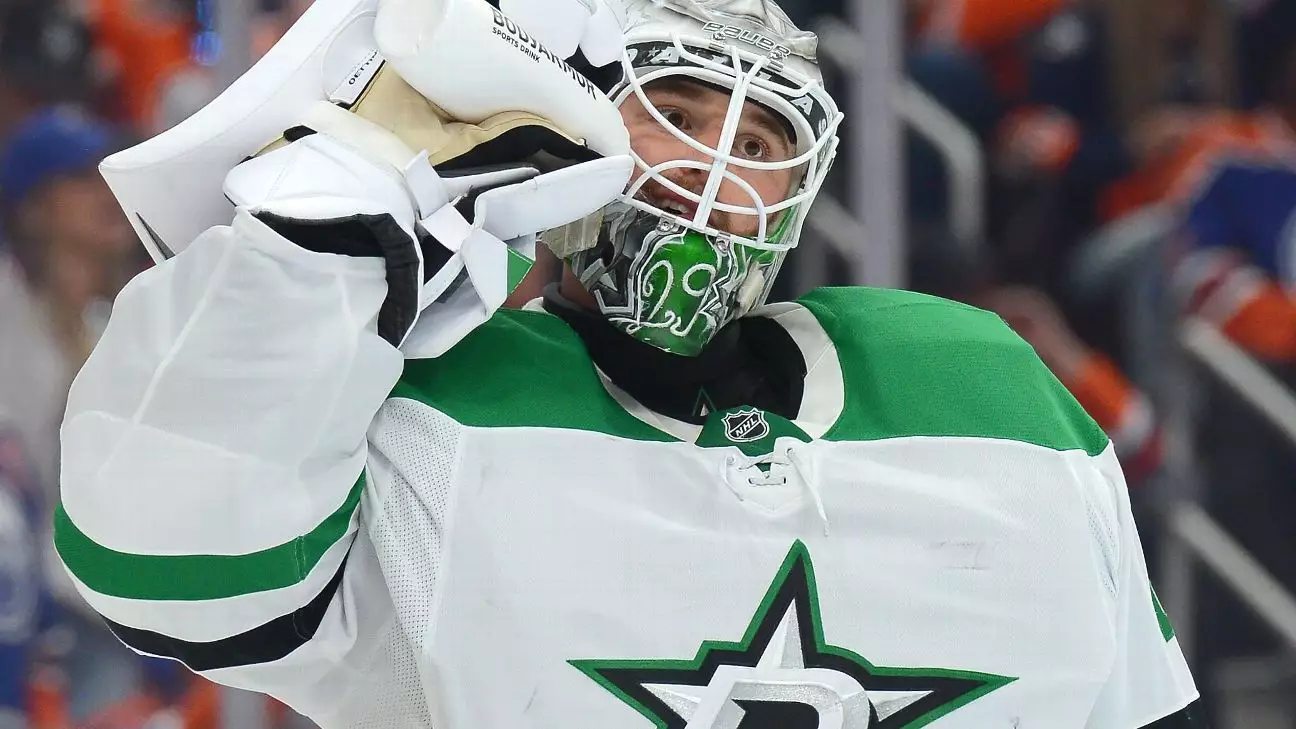In the tense atmosphere of playoff hockey, every decision carries the weight of the world. When Dallas Stars’ goaltender Jake Oettinger was abruptly pulled from Game 5 of the Western Conference finals, the ramifications were immediate and haunting. This decision ignited a firestorm of questions surrounding coach Peter DeBoer’s judgment, leading to scrutiny that stretched long after the game had concluded. Oettinger was visibly perplexed and feeling a sense of embarrassment when yanked from the net after conceding two goals on just as many shots within a measly 7:09. His emotional response was palpable, reflecting not only his desire to win but also the broader implications of playoff performance.
DeBoer admitted the gravity of his decision, expressing a complex mix of support for Oettinger as well as a pragmatic approach to the team’s survival. “There’s one motive, and that’s how do we survive this and get it to a Game 6?” DeBoer cited, underlining the harsh realities that define coaching during high-pressure situations. The rationale behind the choice—to replace a player who had consistently demonstrated skill in significant moments—may seem counterintuitive to anyone observing from a distance, making it a focal point for critics.
The Weight of Expectations and Future Growth
Oettinger’s transparency in his reflections speaks volumes about the mentality necessary for athletes navigating the crucible of elite sports. “The reality is if I make one or two of those saves, then I’m still playing in the game,” he remarked, highlighting a self-analytical approach that many successful athletes embrace. Rather than wallow in the pain of the moment, Oettinger is focused on learning and self-improvement. His perspective, grounded in humility, suggests a maturity beyond his 26 years. He understood the stakes but refused to let the weight of disappointment deter him from looking forward.
With four consecutive trips to the playoffs and several hard-fought series victories, Oettinger is no stranger to pressure. His statistical performance this postseason reveals the heavy burden he carried; he faced an unprecedented number of shots, almost 503, more than any other goalie. Such statistics provide context to his journey, illustrating that while he struggled in a pivotal moment, his broader performance should not be overlooked. A .905 save percentage is solid, especially when viewed through the lens of the intense volume of shots.
Analyzing the Coach-Player Dynamic
The interactions between DeBoer and Oettinger reveal a nuanced layer to professional sports, particularly how relationships evolve under pressure. While Oettinger reported feeling confident in his physical state, there’s an undeniable complexity when it comes to a player’s mental specifically following an unexpected decision. DeBoer indicated that he had not yet spoken to Oettinger post-season, which raises eyebrows about communication crucial for trust and growth. How can a coach ensure a goaltender’s mental well-being while navigating the fierce ambitions of playoff success?
Oettinger, however, reassures that he values the experience for personal development, potentially combing the lines between personal growth and the realization that sports—much like life—are replete with highs and lows. He expressed a singular focus on his performance, dismissing external factors that could detract from his aim. “If I go out there next year and I’m the best goalie in the world, it doesn’t matter,” he said, reinforcing that self-reliance is paramount, even amid swirling public narratives.
Lessons from a Tough Season
Reflecting on the season as a whole, the Stars endured their third consecutive loss in the Western Finals, an emotional toll exacerbated by their recent defeats against the Oilers. Each season of struggle undoubtedly adds layers of complexity to the team’s psyche, as they question how to break through this barrier. The flames of disappointment fuel a fire for change, yet also create a critical moment for reflection. Was Oettinger’s early exit indicative of a systemic issue, or just a blip in an otherwise strong playoff performance?
In this context, the role of coaching staff becomes essential. DeBoer mentioned the conversations he had with his team and how fatigue and external pressures crept into discussions leading to Game 4. As they’re making strategic decisions in real-time, relationships between the coaching staff and players become ever more critical; understanding when to push and when to hold back. This ebb and flow behind the scenes is foundational, creating the fabric of a team that ideally evolves into a stronger unit.
In a world where sport can often feel deterministic, Oettinger’s journey encapsulates the essence of resilience, a culmination of struggle, introspection, and the drive to master both technical skill and mental fortitude.

